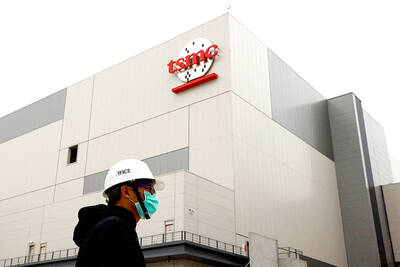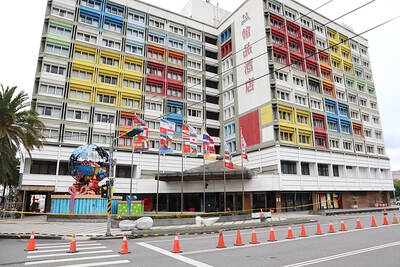ECONOMY
GDP to increase 4%: council
Taiwan’s GDP is expected to grow 4 percent this year, the National Development Council said in a statement yesterday. The council predicted solid growth amid booming outbound shipments, a continuing global economic recovery, more resilient supply chains and the emergence of new technologies. It said that Taiwan’s exports could reach US$472.1 billion this year, up 6.14 percent from last year, and that private consumption would grow 5.36 percent this year. An investment program, which was launched in 2019 and late last year was extended to 2024, would help attract NT$900 billion (US$32.33 billion) in overseas Taiwanese capital back to the country and generate 40,000 job opportunities, the council said. However, several challenges still lie ahead for Taiwan this year, such as inflationary pressure, carbon reduction and the COVID-19 pandemic, the council said.
MANUFACTURING
Sinbon posts record revenue
Connector and cable assembly manufacturer Sinbon Electronics Co (信邦電子) yesterday reported record revenue of NT$2.35 billion for last month, an increase of 11.44 percent from a year earlier and up 8.32 percent from the previous month. The company attributed the results to increasing demand for its products used in the automotive industry, medical and care devices, and industrial applications. The firm’s consolidated revenue totaled NT$2.35 billion last month, surpassing its record of NT$2.25 billion in November last year, Sinbon said in a news release. Cable assemblies contributed to 72.33 percent of the company’s total sales last month, while connectors and other components and accessories made up 27.67 percent, the company said.
CHIP DESIGNERS
Faraday revenue tops NT$1bn
Faraday Technology Corp (智原), a fabless chip design service and silicon patent provider, yesterday said that its revenue for last month exceeded NT$1 billion for the first time in the company’s history, hitting a record high for the third month in a row. Consolidated revenue was NT$1.05 billion, up 12.55 percent month-on-month and 117.09 percent year-on-year, the company said in a statement. Faraday’s revenue mainly comes from its application-specific integrated circuit (ASIC) solutions, non-recurring engineering services and silicon intellectual property business. Last month’s growth momentum benefited mainly from new ASIC solution projects, which should carry into this quarter despite the first quarter of the year being the low season, analysts said.
TESTING SERVICES
Sporton revenue hits record
Sporton International Inc (耕興), which provides professional product testing and certification services, yesterday reported that its revenue continued to climb last month and was the highest in the company’s history. Consolidated revenue increased 1.9 percent month-on-month and rose 25.77 percent year-on-year to a record NT$420.1 million. The increase was due to robust product testing for different wearable devices, smart consumer electronics, telematics and remote healthcare systems that use 5G and Wi-Fi 6E technologies, analysts said. Sporton’s revenue for last year grew 22.94 percent year-on-year to NT$4.32 billion after revenue in the fourth quarter rose 18.11 percent to NT$1.11 billion, as markets continue to migrate to 5G technology, they said. The company would continue to post record revenues this year, buoyed by strong growth momentum, analysts said.

Stephen Garrett, a 27-year-old graduate student, always thought he would study in China, but first the country’s restrictive COVID-19 policies made it nearly impossible and now he has other concerns. The cost is one deterrent, but Garrett is more worried about restrictions on academic freedom and the personal risk of being stranded in China. He is not alone. Only about 700 American students are studying at Chinese universities, down from a peak of nearly 25,000 a decade ago, while there are nearly 300,000 Chinese students at US schools. Some young Americans are discouraged from investing their time in China by what they see

Taiwan Semiconductor Manufacturing Co (TSMC, 台積電), the world’s largest contract chipmaker, yesterday reported record sales for the first quarter, which analysts attributed to solid demand for emerging technologies. Consolidated revenue totaled NT$592.64 billion (US$18.51 billion) in the January-to-March period, up 16.5 percent from a year earlier, but down 5.26 percent from the previous quarter, TSMC said in a statement. The first-quarter revenue beat analysts’ average projection of NT$579.5 billion, Bloomberg News reported. That performance lends weight to expectations that the world’s most valuable chipmaker would return to solid growth this year after weathering a post-COVID-19-pandemic cratering of smartphone and computer sales. TSMC is budgeting

HUALIEN BRANCH: The company had been planning to rebuild the hotel before it was damaged in the quake and vowed to give affected employees the option to transfer The owner of Chateau de Chine Hualien (花蓮翰品酒店) is planning to lay off 86 workers after shutting down the hotel due to damage it sustained in a powerful earthquake on Wednesday last week, the Ministry of Labor said yesterday. The hotel has submitted a layoff report to the Hualien County Government and expects to let 69 workers go this month and 17 next month, the ministry said. LDC Hotels & Resorts Group (雲朗觀光集團), the owner of Chateau de Chine Hualien, confirmed the layoff plan in a statement yesterday. LDC said the hotel has been closed since Wednesday last week when the temblor occurred

US CONSCULTANT: The US Department of Commerce’s Ursula Burns is a rarely seen US government consultant to be put forward to sit on the board, nominated as an independent director Taiwan Semiconductor Manufacturing Co (TSMC, 台積電), the world’s largest contract chipmaker, yesterday nominated 10 candidates for its new board of directors, including Ursula Burns from the US Department of Commerce. It is rare that TSMC has nominated a US government consultant to sit on its board. Burns was nominated as one of seven independent directors. She is vice chair of the department’s Advisory Council on Supply Chain Competitiveness. Burns is to stand for election at TSMC’s annual shareholders’ meeting on June 4 along with the rest of the candidates. TSMC chairman Mark Liu (劉德音) was not on the list after in December last